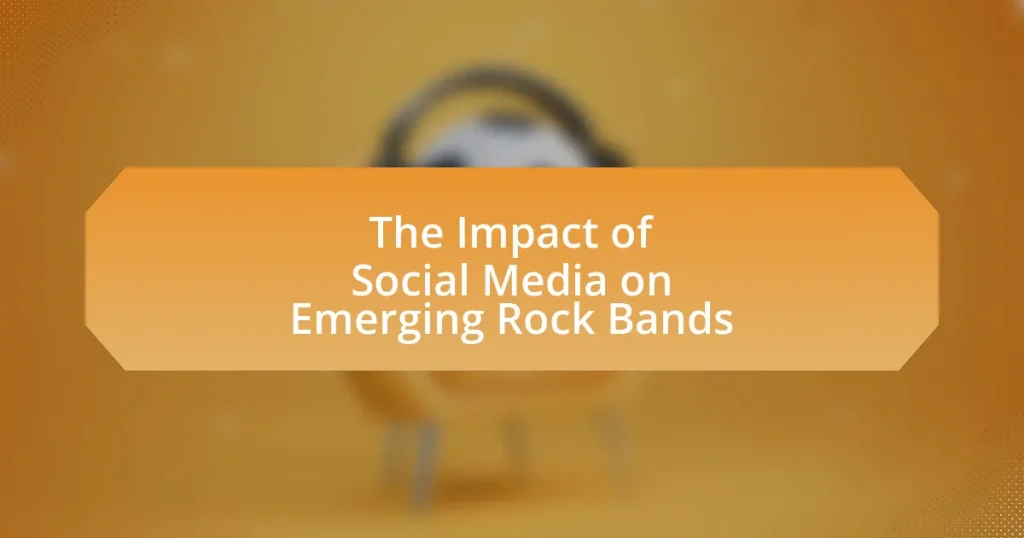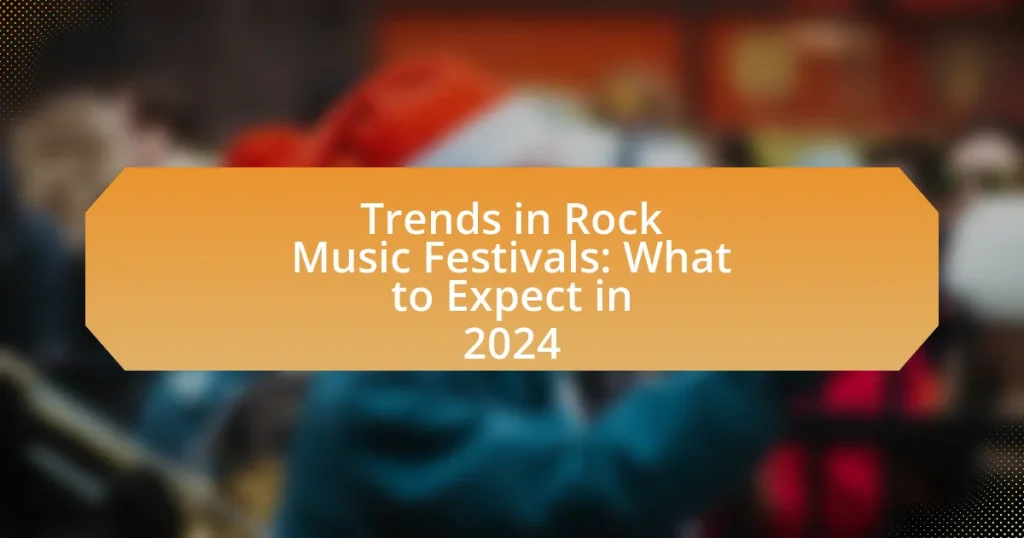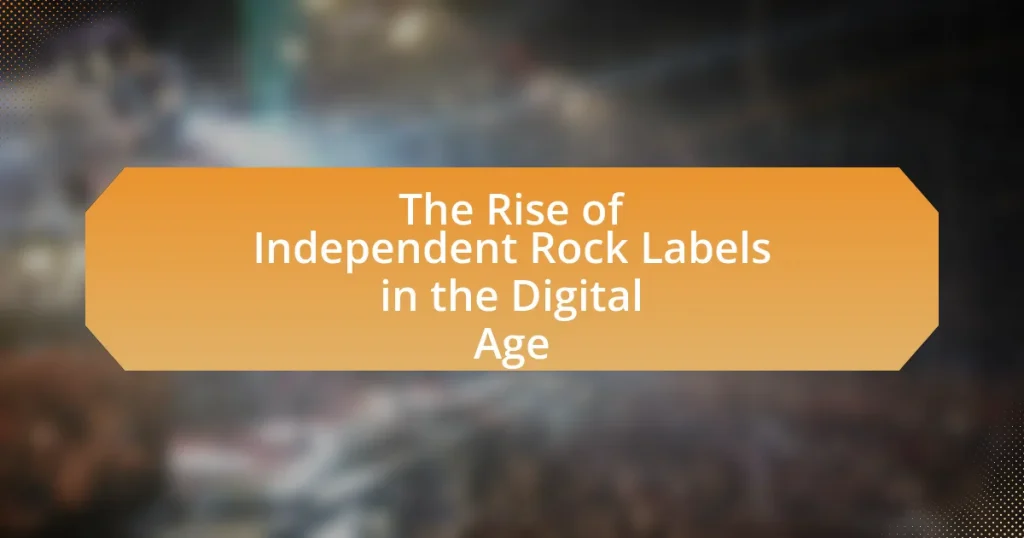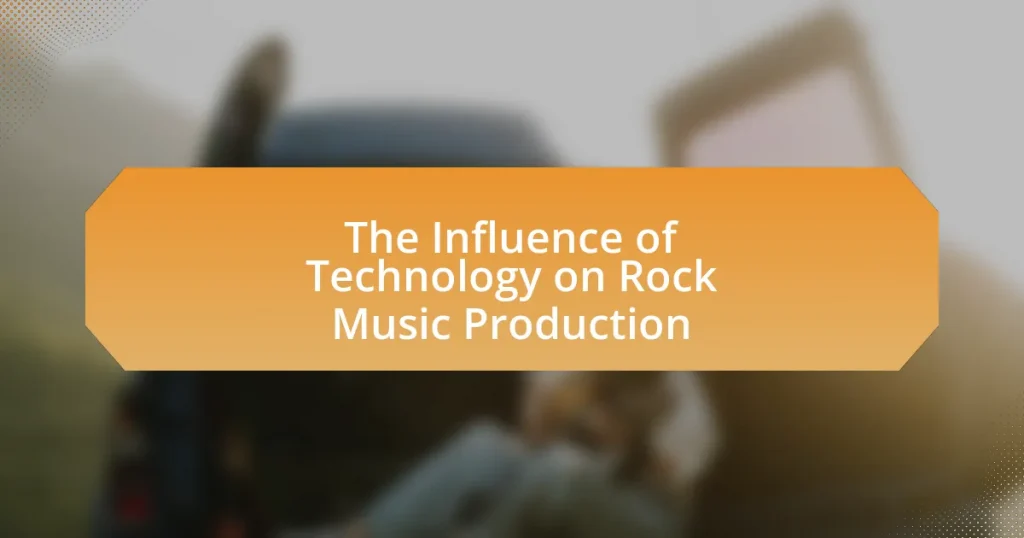The article examines the significant impact of social media on emerging rock bands, highlighting how platforms like Instagram, TikTok, and Spotify facilitate exposure, audience engagement, and marketing. It discusses the transformation of the music industry, emphasizing the direct access bands have to fans and the challenges they face due to competition and negative feedback. Additionally, the article outlines effective strategies for promotion, content types that engage audiences, and best practices for maintaining authenticity while navigating social media. Overall, it provides insights into how social media shapes the creative process and opportunities for emerging rock bands in a competitive landscape.
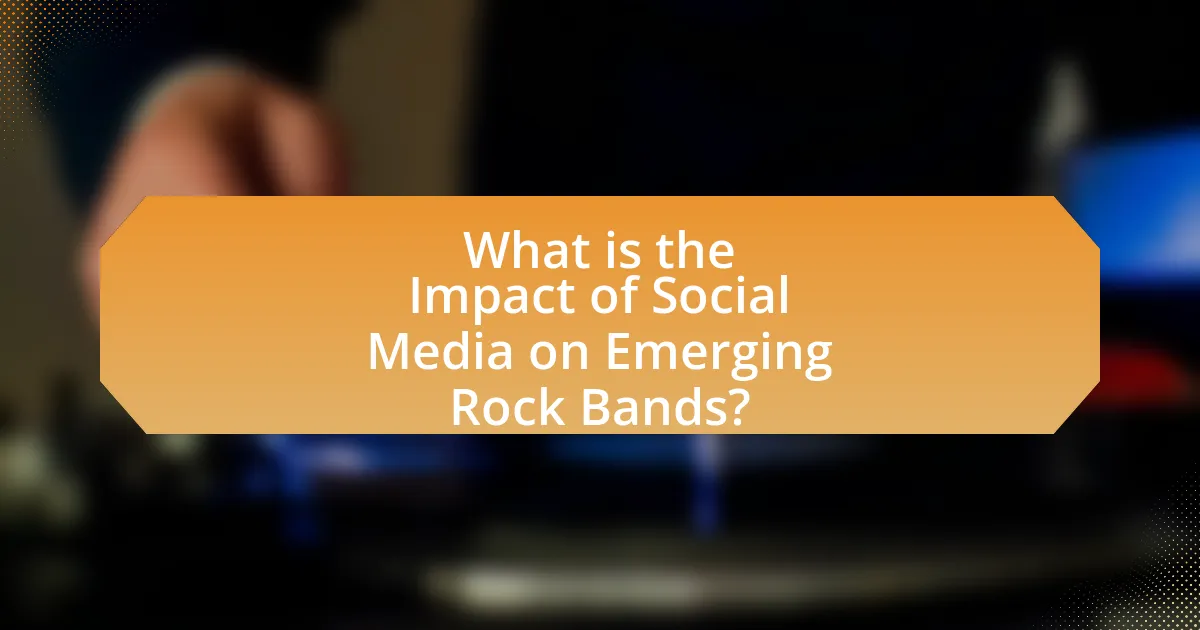
What is the Impact of Social Media on Emerging Rock Bands?
Social media significantly impacts emerging rock bands by providing them with platforms for exposure, audience engagement, and marketing. These platforms allow bands to share their music, connect with fans, and promote their events without the need for traditional media channels. For instance, a study by the University of Southern California found that 70% of emerging artists reported gaining new fans through social media interactions. Additionally, social media analytics enable bands to understand their audience demographics and preferences, allowing for targeted marketing strategies. This direct access to potential listeners has transformed how emerging rock bands build their fan base and promote their music.
How has social media changed the music industry for emerging rock bands?
Social media has transformed the music industry for emerging rock bands by providing them with direct access to audiences and marketing tools that were previously unavailable. Platforms like Instagram, Facebook, and TikTok enable these bands to share their music, engage with fans, and promote their brand without the need for traditional record labels. For instance, a study by the University of Southern California found that 70% of emerging artists use social media to build their fan base, demonstrating its critical role in their marketing strategies. Additionally, viral trends on platforms like TikTok can lead to significant increases in streaming numbers, as seen with the band Ocean Alley, whose song “Confidence” gained popularity through social media, resulting in a 300% increase in streams. This shift allows emerging rock bands to cultivate a following and achieve visibility in a competitive industry landscape.
What platforms are most influential for these bands?
The most influential platforms for emerging rock bands are Instagram, TikTok, and Spotify. Instagram allows bands to visually engage with fans through posts and stories, fostering a community and promoting new music. TikTok has become a powerful tool for music discovery, with viral trends enabling songs to reach a wider audience rapidly; for example, many songs have gained popularity through user-generated content on the platform. Spotify serves as a primary streaming service where bands can distribute their music, gain followers, and access analytics to understand their audience better. These platforms collectively enhance visibility and engagement, crucial for the growth of emerging rock bands.
How do emerging rock bands utilize social media for promotion?
Emerging rock bands utilize social media for promotion by creating engaging content, building a fanbase, and facilitating direct interaction with their audience. These bands often share music videos, behind-the-scenes footage, and live performance clips on platforms like Instagram, Facebook, and TikTok to attract attention and showcase their artistry. According to a 2021 study by the University of Southern California, 70% of emerging artists reported that social media significantly increased their visibility and fan engagement. This direct communication allows bands to receive immediate feedback, foster community, and promote upcoming shows or releases effectively.
What challenges do emerging rock bands face on social media?
Emerging rock bands face significant challenges on social media, primarily due to oversaturation and competition. The music industry is flooded with countless artists, making it difficult for new bands to stand out and gain visibility. According to a 2021 report by the International Federation of the Phonographic Industry, over 60,000 new tracks are uploaded to streaming platforms daily, which highlights the intense competition for audience attention. Additionally, emerging bands often lack the marketing resources and expertise that established artists possess, limiting their ability to effectively promote their music and engage with fans. This combination of high competition and limited resources creates substantial barriers for new rock bands trying to build a following on social media platforms.
How does competition on social media affect visibility?
Competition on social media significantly reduces visibility for emerging rock bands. As numerous artists vie for attention on platforms like Instagram, Facebook, and TikTok, algorithms prioritize content that generates higher engagement, often sidelining less popular or newer accounts. For instance, a study by Hootsuite in 2021 revealed that posts from accounts with fewer followers receive less visibility due to algorithmic bias favoring established profiles. Consequently, emerging bands struggle to reach potential fans, as their content competes against a vast array of established artists and influencers, making it challenging to gain traction and grow their audience.
What are the risks of negative feedback on social media?
Negative feedback on social media poses significant risks to emerging rock bands, primarily affecting their reputation and mental health. Such feedback can lead to a decline in public perception, as negative comments may overshadow positive interactions, resulting in decreased fan engagement and support. Research indicates that 70% of consumers are influenced by online reviews, suggesting that negative feedback can deter potential listeners and concert-goers. Additionally, the psychological impact on band members can be profound; studies show that exposure to negative comments can lead to increased stress, anxiety, and diminished self-esteem, which may hinder their creative output and overall performance.
What opportunities does social media provide for emerging rock bands?
Social media provides emerging rock bands with significant opportunities for exposure, audience engagement, and marketing. By utilizing platforms like Instagram, Facebook, and TikTok, these bands can reach a global audience without the need for traditional media channels. For instance, a study by the International Journal of Music Business Research found that 70% of musicians reported gaining new fans through social media interactions. Additionally, social media allows bands to share their music directly with listeners, receive immediate feedback, and build a community around their brand. This direct interaction fosters loyalty and can lead to increased ticket sales and merchandise purchases, as evidenced by the rise of independent artists who have successfully leveraged social media to grow their careers.
How can social media help in building a fanbase?
Social media helps in building a fanbase by providing platforms for direct engagement and content sharing between artists and their audience. Emerging rock bands can utilize social media to showcase their music, share behind-the-scenes content, and interact with fans in real-time, fostering a sense of community. For instance, a study by the Pew Research Center found that 72% of adults use social media, indicating a vast potential audience for bands to connect with. Additionally, platforms like Instagram and TikTok have algorithms that promote viral content, allowing bands to reach new listeners quickly. This direct access to fans and the ability to create shareable content significantly enhances visibility and engagement, crucial for building a loyal fanbase.
What role does social media play in connecting with industry professionals?
Social media serves as a crucial platform for connecting emerging rock bands with industry professionals. It enables bands to showcase their music, engage with fans, and attract the attention of record labels, promoters, and booking agents. For instance, platforms like Instagram and Twitter allow bands to share their performances and updates, which can lead to increased visibility and networking opportunities. According to a 2021 survey by the Music Industry Research Association, 70% of music industry professionals reported discovering new talent through social media channels, highlighting its effectiveness in fostering connections within the industry.
How does social media influence the creative process of emerging rock bands?
Social media significantly influences the creative process of emerging rock bands by providing platforms for collaboration, audience engagement, and real-time feedback. These platforms enable bands to share their music, ideas, and creative processes with a global audience, fostering a sense of community and collaboration. For instance, a study by the University of Southern California found that 70% of musicians reported using social media to connect with fans and other artists, which enhances their creative output. Additionally, social media allows bands to receive immediate feedback on their work, helping them refine their sound and artistic direction based on audience reactions. This dynamic interaction not only shapes their music but also influences their branding and marketing strategies, making social media an essential tool in the creative landscape for emerging rock bands.
What strategies can emerging rock bands employ to maximize their social media impact?
Emerging rock bands can maximize their social media impact by consistently engaging with their audience through authentic content, strategic collaborations, and targeted advertising. Authentic content, such as behind-the-scenes footage and personal stories, fosters a genuine connection with fans, leading to increased loyalty and sharing. Collaborating with other artists or influencers can expand their reach, as partnerships often introduce the band to new audiences. Additionally, targeted advertising on platforms like Facebook and Instagram allows bands to reach specific demographics, enhancing visibility among potential fans. According to a study by the Pew Research Center, 72% of adults use social media, highlighting its importance for bands to connect with a broad audience effectively.
What are effective content types for engaging audiences?
Effective content types for engaging audiences include videos, live streams, and interactive posts. Videos capture attention quickly, with studies showing that video content generates 1200% more shares than text and images combined. Live streams foster real-time interaction, enhancing audience connection; platforms like Instagram and Facebook report increased engagement rates during live broadcasts. Interactive posts, such as polls and quizzes, encourage participation, leading to higher audience retention and feedback. These content types are proven to enhance engagement, making them essential for emerging rock bands leveraging social media.
How can bands measure their social media success?
Bands can measure their social media success through key performance indicators (KPIs) such as engagement rate, follower growth, and reach. Engagement rate, calculated by dividing the total interactions (likes, comments, shares) by the total followers, provides insight into how well content resonates with the audience. Follower growth indicates the effectiveness of promotional strategies and overall interest in the band, while reach measures how many unique users see the content, reflecting visibility. According to a 2021 report by Hootsuite, brands that actively track these metrics see a 30% increase in audience engagement over those that do not.
What are the best practices for emerging rock bands on social media?
Emerging rock bands should prioritize consistent engagement, authentic content, and strategic platform use on social media. Consistent engagement involves regularly posting updates, responding to fans, and interacting with followers to build a loyal community. Authentic content, such as behind-the-scenes footage, personal stories, and live performances, resonates more with audiences and fosters a genuine connection. Additionally, choosing the right platforms—like Instagram for visuals and TikTok for short videos—can maximize reach and engagement. According to a 2021 study by the International Journal of Music Business Research, bands that actively engage with their audience on social media see a 30% increase in fan interaction and a 25% increase in streaming numbers.
How can bands maintain authenticity while promoting themselves?
Bands can maintain authenticity while promoting themselves by staying true to their musical identity and engaging genuinely with their audience. This involves creating content that reflects their unique sound and values, rather than conforming to trends that may dilute their artistic vision. For instance, a study by the University of Southern California found that artists who share personal stories and behind-the-scenes content on social media foster deeper connections with fans, enhancing their perceived authenticity. By prioritizing meaningful interactions and consistent messaging, bands can effectively promote themselves without compromising their core essence.
What common mistakes should emerging rock bands avoid on social media?
Emerging rock bands should avoid inconsistent posting on social media. Inconsistent posting can lead to decreased engagement and visibility, as algorithms favor active accounts. Additionally, bands should refrain from overly promotional content, as excessive self-promotion can alienate followers. Research indicates that brands, including music acts, that balance promotional posts with engaging content see higher interaction rates. Furthermore, neglecting audience interaction is a mistake; failing to respond to comments or messages can create a disconnect with fans. Engaging with followers fosters community and loyalty, which is crucial for emerging artists. Lastly, bands should avoid using multiple platforms without a cohesive strategy, as this can dilute their brand message and confuse potential fans.
